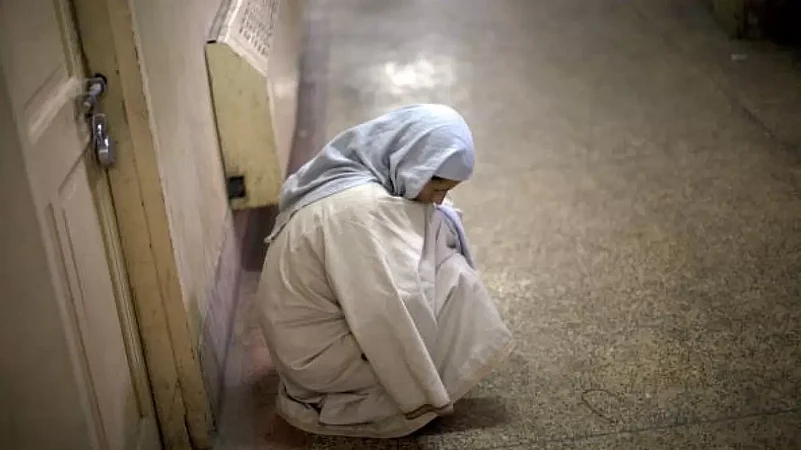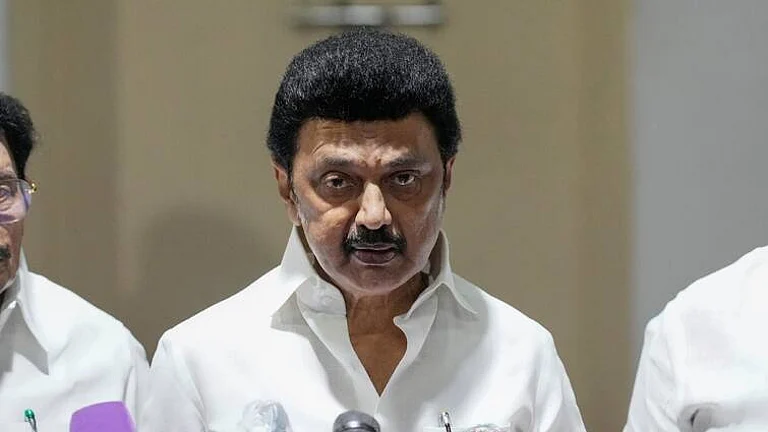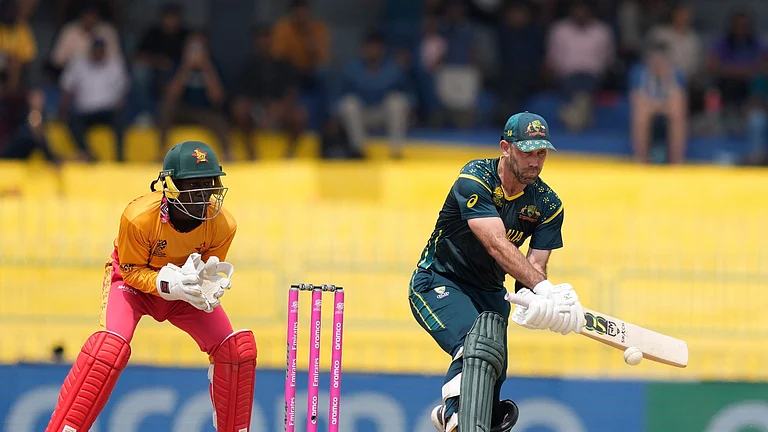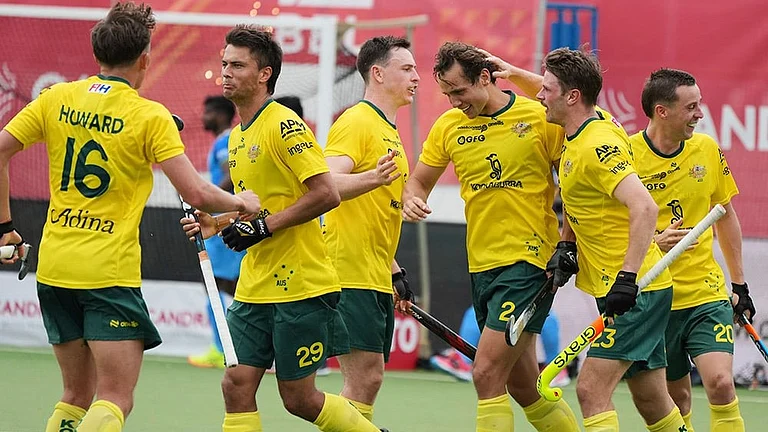It was a call at midnight. A counsellor psychologist at the Tele Mental Health Assistance Centre Srinagar picks up the call.
"The caller had irresistible ideas to self-harm. He wanted to end his life and before that, he wanted to talk to someone about it,” says Areej Khalid, the counsellor at the Tele Mental Health Centre in Srinagar.
The Centre is located at the old building of the Institute of Mental Health and Neurosciences in Srinagar (IMHNS), previously called the Psychiatric Disease Hospital. The toll-free phones at the centre are buzzing, counsellors picking them up, some talking to them in Kashmiri and some in Urdu, advising the callers what to do.
That night Khalid heard the caller. “He was in terrible pain,” she says during her 30-minute break.
"I used techniques I learned during my training to achieve pause in him. I tried to create a momentary interruption to break the cycle of self-harm thinking. I am grateful that I succeeded," she says.
"I was able to take him to the safety of his family's supervision," she says. She guided him to a nearby mental health facility for further treatment and it all happened on through a call.
Later when the person called again, the crisis was over and he had started following a psychiatrist and is on weekly cognitive behavioural therapy sessions with the centre.
“The midnight calls are mostly about crisis situations with many youngsters talking about self-harming or having such thoughts,” says Khalid.
The Tele Mental Health Centre Srinagar since its establishment in October 2022 has received nearly 12,500 calls related to mental health disorders. These include around 500 “crisis interventions" in people having self-harming ideas.
The centre has a three-tier system in place. The first line is of counsellors, who receive calls from people having depression, anxiety disorders, substance abuse disorders, exam stress and other anxiety issues.
The counsellors are all psychologists. The typical session lasts around 30 minutes but some sessions take more time.

In case the counsellors feel that any caller needs a psychiatrist’s advice, they transfer a call to a psychiatrist or a clinical psychologist on call. The third tier of the system is the Institute of Mental Health and Neurosciences in Srinagar (IMHNS).
“It started slowly but now we receive around 100 calls in a day and most of these calls are from women,” says Khalid, who like other counsellors has been trained at the National Institute of Mental Health and Neuro-Sciences Banglore and IMHANS Srinagar. She says if the counsellor comes to the conclusion that the caller needs medicine, or having a recurring panic attack, the counsellor transfers the call to the psychiatrist or clinical psychologist on the call.
While 70 per cent of mental health distress calls are handled by the counsellors themselves, 30 per cent of calls are escalated to the consultants.
“Most of the calls are stress related. We also get calls from those persons already diagnosed with mental disorders like anxiety and OCD,” says Suriya Sanam, another counsellor.
The calls also reflect the prevailing mental health situation in Kashmir. There has been a rise in mental health cases in Kashmir in the past thirty years of conflict.
According to a study “Mental health in Kashmir: conflict to COVID-19” 45% of Kashmir's adult population (1.8 million) is suffering from some form of mental distress. There is a high prevalence of depression (41%), anxiety (26%), post-traumatic stress disorder (19%), and 47% had experienced some trauma.
“Our counselling is affordable and we are just a call away. That might be the reason people feel it much more secure to call and confide to us,” Sanam says. She says that the highest number of calls revived in a day was 160 when an advertisement about the Tele Mental Health services had come up in widely circulated local English daily of Kashmir.
“We also get calls from persons involved in substance abuse. We receive such distressing calls during the night hours,” says Sanam.
Over the years Kashmir has seen a spike in substance abuse cases and the government is considering drug abuse as one of the serious issues.
According to the latest survey, “Prevalence and Pattern of Substance Use Disorders in Ten Districts of Kashmir” carried out by the IMHANS, Kashmir, the Valley has an estimated sizable population of 67 468 substance-dependent individuals. While opioid dependence prevalence in all the 10 districts of Kashmir is 2.23% and the total number of opioid dependents is estimated to be 52 404 in the Kashmir valley making it an epidemic.
At the Tele Mental Health Assistance Centre of Srinagar, 19 counsellors are on the job in different shifts throughout the week catering to different calls. All these counsellors are women.
Dr Patley Rahul, an Assistant Professor at the NMHANS Banglore, says people who call the centre and open up about their self-harm thoughts are the most important calls. “These are the kind of patients who need attention and care. The suicidal thoughts are fleeting thoughts. These thoughts stay unless there is some intervention done,” he says.
“In this respect, Srinagar centre is doing exceptionally well,” he says.
“When someone is in distress they want a listening ear. This calms them down and also motivates them to avail the psychiatric services. That is the whole idea of Tele Mental Health services,” he adds.
The Srinagar centre is now considered a model centre among 22 centres. These centres are coordinated by the National Institute of Mental Health and Neuro-Sciences a medical institution in Bangalore.
Dr Rahul says the data of Srinagar Centre is impressive. “How the counsellors have handled nearly 500 suicide calls shows their competence,” he adds. “We are thinking to replicate this model in other centres of the country,” Dr Rahul says.
The Tele Mental Health service concept came after Covid-19 in 2020 lockdown when everything was shut and availing of medical facilities became a tough challenge. In October 2023 the concept took shape after the government of India under NHRM opened these centres in 22 states across India. Of 22 centres, the Centre at the IMHNs is the only centre that is fully functional.
Dr Arshad Hussain, professor at the Institute of Mental Health and Neurosciences in Srinagar (IMHNS), says the past six months' performance of the Tele Mental Health Service has two messages, quantitative and qualitative.

“The quantitative statement is nearly 12500 people have sought help regarding mental health issues second highest in the country meaning thereby that this mode of Mental Health delivery has acceptance in our society. And qualitatively these calls have a life-saving potential statement as pause has been achieved and these people have been linked to mental health services," he says.
"They definitely have chances of better outcomes if comprehensive safety plan and treatment is done following a pause," he says.
While he concedes that the tendency to self-harm is a very complex problem and a mere pause is not enough, he says, "We need to treat underlying mental health issues in many of them to save lives.”
"We have been able to link most of them to the nearest mental health service and pause can act as mental health first aid for such people," Dr Hussain says.
“We are able to give first aid. We are able to achieve linkages. There are people who don’t know where to go. We guide these people to avail mental health facilities. Thus we create linkages,” he says.
Dr Hussain says initially women callers outnumbered men but now men are catching up as well. "Our centre is unique in the whole of India with more female callers. It is in sync with what we see at OPD at the hospital. Most of our patients are women,” he says.
Besides, as the counsellors are women, women prefer to call them. “Maybe they feel more empathy and maybe through word of mouth they ask others to avail of such services,” says Khalid smiling.


























